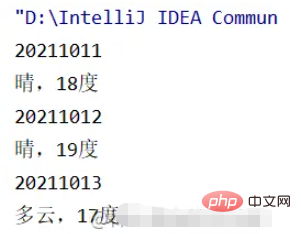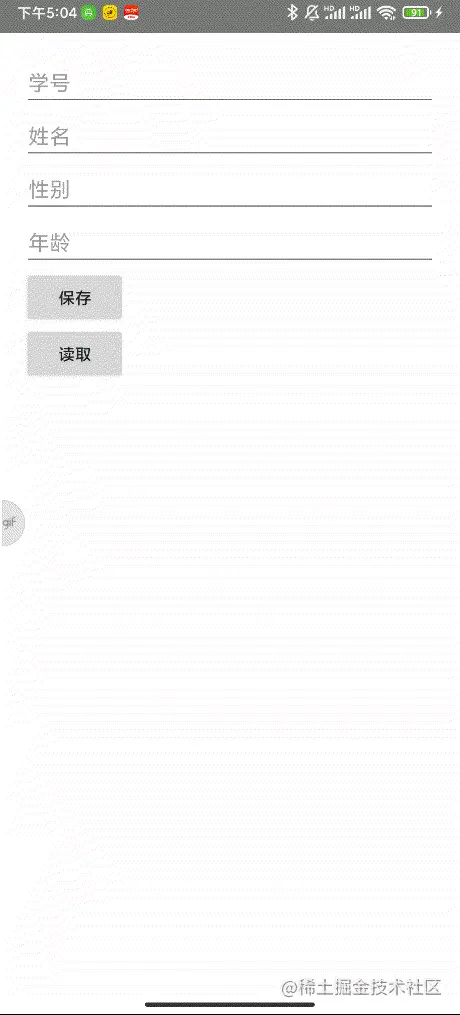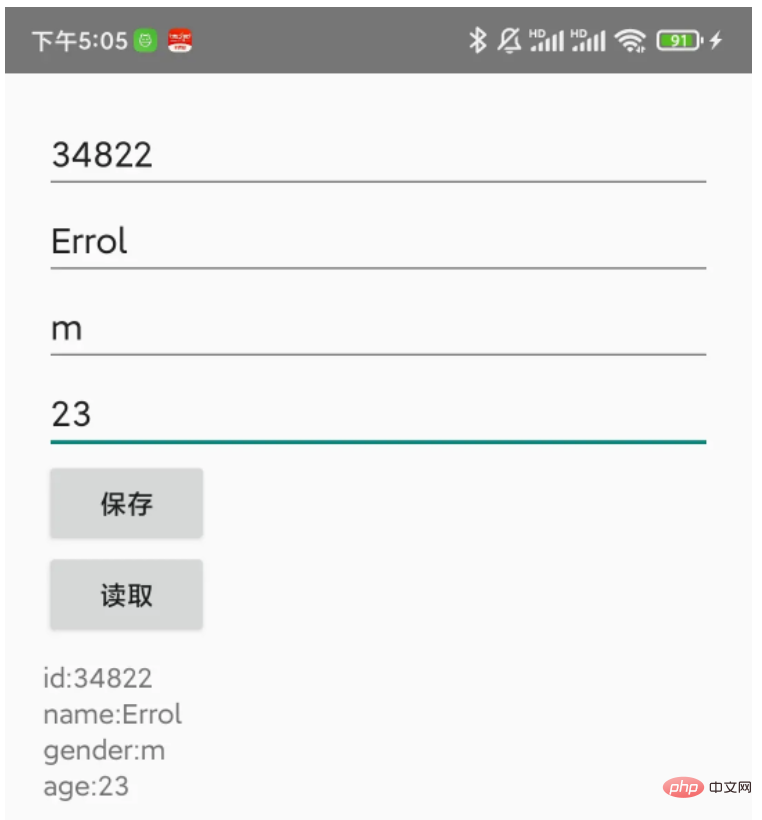ホームページ >Java >&#&チュートリアル >JavaのDataInputStreamとDataOutputStreamの使い方
JavaのDataInputStreamとDataOutputStreamの使い方
- WBOYWBOYWBOYWBOYWBOYWBOYWBOYWBOYWBOYWBOYWBOYWBOYWB転載
- 2023-04-28 18:40:161895ブラウズ
はじめに
io パッケージでは、プラットフォームに依存しない 2 つのデータ操作ストリーム、データ出力ストリーム (DataOutputStream) とデータ入力ストリーム (DataInputStream) が提供されます。
通常、データ出力ストリームは特定の形式でデータを出力し、データはデータ入力ストリームを通じて特定の形式で読み込まれます。 DataOutputStream と DataOutputStream は、固定バイト形式のデータの読み取りと書き込みに使用されます。
DataOutputStream
オブジェクトの作成
DataOutputStream out = new DataOutputStream(相接的流)
メソッドint 型データをデータ出力ストリームに書き込みます。最下層は基本出力ストリームに 4 バイトを書き込みます
writeInt(int i)
データ出力ストリームに double 型のデータを書き込みます。最下層は double を long 型に変換し、それを基本出力ストリームに書き込み、8 ワードを出力します。セクション
writeDouble(double d)
マシンに依存しない方法で UTF-8 エンコーディングを使用して、基になる出力ストリームに文字列を書き込みます。最初に文字列のバイト長を表す 2 バイトを出力し、次にこれらのバイト値を出力します
writeUTF()
DataInputStream
Create object
DataInputStream dis = new DataInputStream(InputStream in);
メソッドデータ入力ストリームから int 型データを読み取り、4 バイトを読み取り
readInt()
8 バイトを読み取り
readDouble()
最初のセクションを 2 ワード読み取り、文字列のバイト長を決定します。次に、これらのバイト値を読み取ります
readUTF()
ヒント:読み取りが完了し、再度読み取るときに EOFException が発生します
Chestnut 1 :Write data
public class Main {
public static void main(String[] args) throws Exception {
DataOutputStream out = new DataOutputStream(new FileOutputStream("d:/abc/f5"));
out.writeInt(20211011);
out.writeUTF("晴,18度");
out.writeInt(20211012);
out.writeUTF("晴,19度");
out.writeInt(20211013);
out.writeUTF("多云,17度");
out.close();
}
}実行結果:

public class Main {
public static void main(String[] args) throws Exception {
DataInputStream in = new DataInputStream(new FileInputStream("d:/abc/f5"));
try {
while (true) {
int date = in.readInt();
String s = in.readUTF();
System.out.println(date);
System.out.println(s);
}
} catch (EOFException e) {
//正确读取结束,不需要处理
}
in.close();
}
}
実行結果:

名前00 03 61 62 63
Gender00 61
Age00 00 00 16
<LinearLayout xmlns:android="http://schemas.android.com/apk/res/android"
android:layout_width="match_parent"
android:layout_height="match_parent"
android:orientation="vertical"
android:padding="20dp">
<EditText
android:id="@+id/et1"
android:layout_width="match_parent"
android:layout_height="wrap_content"
android:hint="学号" />
<EditText
android:id="@+id/et2"
android:layout_width="match_parent"
android:layout_height="wrap_content"
android:hint="姓名" />
<EditText
android:id="@+id/et3"
android:layout_width="match_parent"
android:layout_height="wrap_content"
android:hint="性别" />
<EditText
android:id="@+id/et4"
android:layout_width="match_parent"
android:layout_height="wrap_content"
android:hint="年龄" />
<Button
android:id="@+id/btn1"
android:layout_width="wrap_content"
android:layout_height="wrap_content"
android:text="保存" />
<Button
android:id="@+id/btn2"
android:layout_width="wrap_content"
android:layout_height="wrap_content"
android:text="读取" />
<TextView
android:id="@+id/tv"
android:layout_width="match_parent"
android:layout_height="wrap_content"
android:layout_marginTop="10dp" />
</LinearLayout>
public class IoActivity extends AppCompatActivity {
private EditText et1;
private EditText et2;
private EditText et3;
private EditText et4;
private Button btn1;
private Button btn2;
private TextView tv;
@Override
protected void onCreate(Bundle savedInstanceState) {
super.onCreate(savedInstanceState);
setContentView(R.layout.activity_io);
setViews();
setListeners();
}
private void setViews() {
et1 = findViewById(R.id.et1);
et2 = findViewById(R.id.et2);
et3 = findViewById(R.id.et3);
et4 = findViewById(R.id.et4);
btn1 = findViewById(R.id.btn1);
btn2 = findViewById(R.id.btn2);
tv = findViewById(R.id.tv);
}
private void setListeners() {
btn1.setOnClickListener(view -> baocun());
btn2.setOnClickListener(view -> duqu());
}
private void baocun() {
//IO操作有IO异常,所以进行try...catch...
/*
*
* ┌DataOutputStream
* ┌FileOutputStream
* sdcard
*/
try {
int id = Integer.parseInt(et1.getText().toString());
String name = et2.getText().toString();
String gender = et3.getText().toString();
int age = Integer.parseInt(et4.getText().toString());
DataOutputStream out = new DataOutputStream(
new FileOutputStream(getExternalFilesDir(null) + "/stu.txt", true)
);
out.writeInt(id);
out.writeUTF(name);
out.writeChar(gender.charAt(0));
out.writeInt(age);
out.close();
Toast.makeText(this, "保存成功", Toast.LENGTH_SHORT).show();
} catch (Exception e) {
Toast.makeText(this, "保存失败", Toast.LENGTH_SHORT).show();
e.printStackTrace();
}
}
private void duqu() {
//IO操作有IO异常,所以进行try...catch...
try {
DataInputStream in = new DataInputStream(
new FileInputStream(getExternalFilesDir(null) + "/stu.txt")
);
try {
tv.setText("");
while (true) {
int id = in.readInt();
String name = in.readUTF();
char gender = in.readChar();
int age = in.readInt();
tv.append("id:" + id + "\n" + "name:" + name + "\n" + "gender:" + gender + "\n" + "age:" + age + "\n");
}
} catch (EOFException e) {
}
in.close();
Toast.makeText(this, "读取成功", Toast.LENGTH_SHORT).show();
} catch (Exception e) {
Toast.makeText(this, "读取失败", Toast.LENGTH_SHORT).show();
e.printStackTrace();
}
}
}


次のパスを取得します#/storage/emulated/0/Android/data/yourPackageName/files
プログラムを実行すると、このパスに stu.txt ファイルが生成されます。このディレクトリは、アプリケーションが削除されると削除されます。アンインストールされており、このディレクトリへのアクセスには STORAGE 権限のための動的アプリケーションは必要ありません。
以上がJavaのDataInputStreamとDataOutputStreamの使い方の詳細内容です。詳細については、PHP 中国語 Web サイトの他の関連記事を参照してください。

